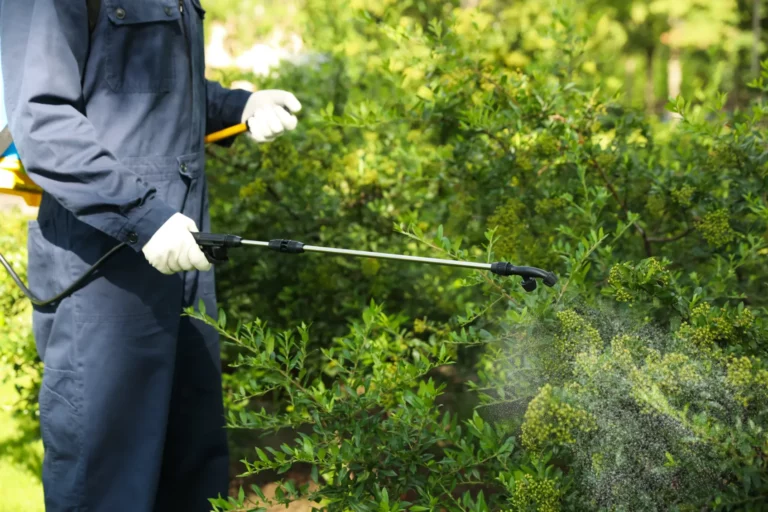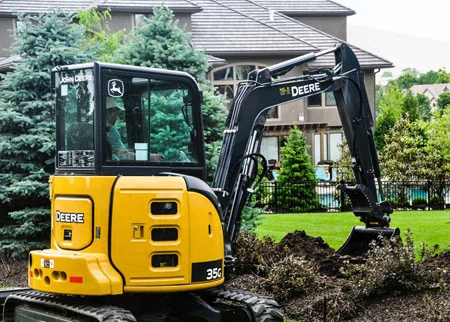Battling pests in your lawn and landscape demands precision and sensitive tactics. At Doctor’s Lawn and Landscape, we deploy a series of targeted measures, including soil assessment, pest identification, and an individualized control plan that embraces eco-friendly practices like Integrated Pest Management (IPM). Our award-winning team with over 30+ years of experience shares the multifaceted steps we take to protect your green spaces, promising health and longevity without jeopardizing the ecosystem. Call us today at 913-423-9587 and let’s preserve your lush landscapes responsibly.
Our Customized Pest Control Approach
Doctor’s Lawn and Landscape prioritizes comprehending the distinctive characteristics of your lawn before initiating any pest control procedures. This includes assessing:
- the soil quality
- sun exposure
- existing vegetation
- other factors that could influence pest activity
Understanding these elements allows us to formulate a tailored lawn care strategy that tackles your precise pest concerns. This individualized approach guarantees that our pest control efforts are purposeful, resourceful, and, above all, successful.
Our comprehensive lawn care plan includes a suite of services such as fertilization, weed control, and pest management, all designed to work together for the optimal health and appearance of your lawn. Doctor’s Lawn and Landscape is confident that fostering the well-being of your lawn equips it with a strong shield against prevalent pests.
Identifying Pests and Their Impact
The first step in our pest control program is to accurately identify the specific pests that are causing problems in your lawn or yard. This is crucial because different pests require different control methods. Our team of lawn care professionals conducts a thorough inspection of your yard and the foundation of your home to identify any pest issues. Doctor’s Lawn and Landscape also utilize resources like the comprehensive guides provided by the University of Minnesota Extension Yard and Garden educators to identify and address issues related to commonly found pests. Accurately identifying pests and comprehending their behavior enables us to create an enhanced pest control strategy.
Developing a Pest Control Plan
Once we’ve identified the pests and assessed their potential impact on your lawn, the next step is to develop a comprehensive pest control plan. This goes beyond just treating existing infestations. It includes implementing preventive measures to keep pests from returning, as well as ongoing maintenance services to ensure your lawn remains pest-free.
Doctor’s Lawn and Landscape employs crucial tools and methods to tackle and mitigate pest problems effectively. This includes recommending homeowners to seal cracks in the foundation of their homes to prevent pest entry. Our pest control plan also involves systematic inspections and treatments, which constitute an essential aspect of the continuous upkeep of your lawn. We take great pride in providing these services to ensure your lawn remains healthy and beautiful all year round.
Pest Control Solutions

Doctor’s Lawn and Landscape acknowledges the importance of pest elimination, we prioritize various pest control methods, including the use of Integrated Pest Management (IPM) techniques.
IPM is an approach that involves long-term pest prevention through a variety of techniques, including biological control and habitat manipulation. Proactive environmental management helps prevent pests from becoming a nuisance initially.
Moreover, Doctor’s Lawn and Landscape uses other products containing a blend of cedar and peppermint oil, renowned for their natural pest control properties and safety for people, pets, and the surroundings.
Natural-Based Sprays
Natural-based sprays are among our preferred pest control solutions. These sprays are safe for people, pets, and the atmosphere, thanks to the absence of chemicals that lead to significant air or water pollution. Instead, they contain plant-based or enzyme-based cleaners that are biodegradable and pose no harm to pets.
Formulating these natural sprays requires basic ingredients like bug juice watered down or mild dish soap combined with water. They have shown potential as a viable alternative for pest management, provided they become cost-effective, target-specific, and more efficient. Using these sprays also reduces the necessity for interior spraying, as they deter pests without the use of harsh chemicals.
Integrated Pest Management (IPM)
Our pest control methodology heavily incorporates Integrated Pest Management (IPM). It is a strategy rooted in life system principles, aimed at preventing pests or their damage over the long term by utilizing various techniques, including:
- Biological control
- Cultural control
- Mechanical control
- Physical control
- Chemical control (as a last resort)
Employing IPM allows us to reduce the application of detrimental chemicals on your lawn. This approach focuses on promoting a safer lawn, especially by minimizing children’s exposure to pesticides. The advantages of IPM encompass:
- Utilization of diverse control methods, resulting in a safer and healthier area
- Preservation of beneficial natural predators of pests
- Reduced climate impact
- Conservation of resources
- Decreased pesticide usage
- Cost-effectiveness
Lawn Care Practices for Pest Prevention
Appropriate lawn care practices are vital for pest prevention, extending beyond targeted pest control methods. A healthy lawn is your first line of defense against pests. When your lawn is thriving, it is less susceptible to pest infestations. That’s why Doctor’s Lawn and Landscape always emphasizes regular lawn care as a crucial aspect of our pest control services.
One of the key areas we focus on is preventing water from accumulating in your yard, including addressing clogged gutters. Stagnant water can be a breeding ground for mosquitoes and other pests. By implementing effective irrigation and drainage systems, we can help eliminate standing water and reduce environments favorable for pest breeding. Moreover, proper fertilization plays a crucial role in providing essential nutrients for grass to thrive, resulting in a robust lawn that is less susceptible to pests.
Proper Fertilization and Irrigation
Fertilization and irrigation are two key aspects of our lawn care services. Proper fertilization improves the nutritional quality of plant tissue, which in turn can discourage pests and promote robust lawn growth. Utilizing organic fertilizers such as garlic spray to repel insects and maintaining a well-fertilized lawn to enhance plant resistance against pests are considered the best practices for preventing pests through fertilization.
On the other hand, proper irrigation plays a crucial role in maintaining plant health and reducing their susceptibility to insect pests. Doctor’s Lawn and Landscape customizes an irrigation plan by:
- Assessing the specific water requirements of the grass and soil type in your lawn
- Implementing a personalized irrigation schedule
- Effectively managing water usage
- Preventing conditions that attract pests
By following these steps, we can ensure that your lawn remains healthy and pest-free.
Weed Control and Mulching
Weed control is another essential aspect of our lawn care services. Weeds can serve as a habitat for pests, so by effectively controlling weeds, we can discourage pests from infesting your lawn. We use a combination of mechanical methods such as hand-pulling, hoeing, and mowing, as well as the use of herbicides, to effectively control weeds.
In addition to weed control, we also use mulching techniques to deter pests. Mulching enhances soil chemistry, inhibits weed growth, and directly repels certain insects. Doctor’s Lawn and Landscape recommends keeping organic mulch and waterproof synthetics 6 inches or more back from plant trunks to avoid promoting root and crown diseases, and regularly inspecting mulch and removing any weeds soon after they appear.
By implementing these practices, we can effectively manage pests and maintain a healthy, thriving lawn.
Protective Measures for Fruit Trees and Gardens
If you have fruit trees or a garden on your property, you’ll know that they require special care to protect them from pests. At Doctor’s Lawn and Landscape, we provide specialized services to safeguard your fruit trees and garden from pests and diseases.
Implementing precautionary steps like:
- endorsing healthy soil
- opting for resistant varieties
- strategic planting
- enticing beneficial insects
- warding off pests
- rotating crops
- employing physical barriers, such as protective clothing
is advised. Regular maintenance services, such as proper training, annual pruning, and removal of broken or infested branches, also play a crucial role in safeguarding fruit trees and gardens from pests.
Pest-Proofing Your Home and Property
Pest control extends beyond maintaining your lawn and garden; it also involves safeguarding your home and property against pests. As part of our pest control services, we offer pest-proofing services to keep your home safe from unwanted pests.
We use a systematic approach for pest-proofing that includes the targeted application of chemicals and lawn pesticides to eradicate invasive pests from the lawn. Doctor’s Lawn and Landscape also offers perimeter pest control services to mitigate the ingress of external insects into your home. In addition to professional pest-proofing, we also recommend natural methods such as using natural fly traps, essential oil sprays, fresh herbs, and coffee grounds to complement our services.
Monitoring and Ongoing Pest Management
Efficient pest control isn’t limited to treating present infestations; it’s an ongoing process necessitating routine surveillance and management. At Doctor’s Lawn and Landscape, we provide regular inspections and treatments to ensure your lawn and landscape remain pest-free.
Our ongoing pest management techniques encompass integrated pest management (IPM) methods, which include:
- Long-term planning
- Regular mowing
- Proper lawn care
- Weed control
- Proper irrigation and drainage
- Regular inspections
Doctor’s Lawn and Landscape recommends conducting lawn pest control treatment for lawns and gardens quarterly to effectively manage pests.
Pest Control for a Beautiful and Functional Outdoor Space

Although our pest control services primarily focus on preserving the health of your lawn and landscape, they also enhance the aesthetics and functionality of your outdoor space by targeting many insects. Pests such as:
- leaf miners
- stem borers
- fruit borers
- root borers
and others can impact the visual appeal of your outdoor area.
By controlling these pests, we can help preserve the aesthetic appeal of your outdoor space. At the same time, pests can also impact the functionality of an outdoor area by:
- causing damage to plants
- consuming leaves
- spreading plant diseases
- attracting other pests with their secretions.
Our pest control methods, including consistent trimming of lawns and shrubs, preventive techniques, and regular maintenance tasks like pruning and weeding, help manage pests while preserving the beauty and functionality of your outdoor space.
How Doctor’s Lawn and Landscape Can Help You
Maintaining a beautiful and healthy lawn is no small task, especially when you have to deal with various pests. However, with the right pest control services, it doesn’t have to be a daunting task. At Doctor’s Lawn and Landscape, we provide customized pest control solutions that effectively address your specific pest issues while preserving the health and aesthetics of your lawn.
Doctor’s Lawn and Landscape is more than a pest control company. We offer customized pest control solutions designed to cater to each client’s unique needs. Whether you’re dealing with stubborn weeds, pesky insects, or intrusive rodents, we’re here to help.
We offer a range of professional lawn care services, including pest control and maintenance services to ensure the health and visual appeal of your lawn. Our customer service approach is tailored for each residential or corporate client, focusing on understanding their specific requirements and maintaining efficient communication. Doctor’s Lawn and Landscape endeavors to serve as a comprehensive resource for clients, offering assistance and solutions to address any inquiries related to their lawn and landscaping requirements.
To learn more about our services, contact us at 913-423-9587 or visit https://doctorslawn.com/
Frequently Asked Questions
What are the preventive measures for pest control?
Preventive measures for pest control involve maintaining a clean and well-organized environment to minimize conditions conducive to pest infestation. This includes proper waste management, sealing entry points, and regular inspection for signs of pests. Additionally, promoting natural predators of pests and using resistant plant varieties are effective preventive strategies.
How is pest control done?
Pest control can be achieved through various methods, including chemical, biological, and cultural approaches. Chemical methods involve the use of pesticides, while biological methods introduce natural predators to control pest populations. Cultural methods focus on altering the environment, such as rotating crops or using pest-resistant plants. Integrated Pest Management (IPM) combines these approaches for a comprehensive pest control strategy.
What is the first step in implementing an effective pest control program?
The first step in implementing an effective pest control program is to conduct a thorough assessment of the pest situation. This involves identifying the specific pests, understanding their lifecycle, and assessing the extent of the infestation. A comprehensive understanding of the pest problem allows for the development of a targeted and customized pest management plan tailored to the unique needs of the situation.
How do proper fertilization and irrigation contribute to pest control?
Proper fertilization and irrigation play a crucial role in pest control by promoting plant health and resilience. Well-nourished and adequately hydrated plants are better equipped to withstand pest attacks and recover from potential damage. Balanced fertilization provides essential nutrients, while efficient irrigation ensures optimal moisture levels, creating an environment less favorable for certain pests. This integrated approach supports a healthy landscape, reducing the likelihood of pest infestations.
What are the benefits of Integrated Pest Management (IPM)?
Integrated Pest Management (IPM) offers several benefits, including reduced reliance on chemical pesticides, which helps preserve environmental balance. By incorporating various strategies like biological controls and cultural practices, IPM minimizes the risk of pesticide resistance in pests. Furthermore, IPM is cost-effective in the long run, as it focuses on preventing pest issues before they escalate.
How can homeowners contribute to pest control in their gardens?
Homeowners can contribute to pest control in their gardens by practicing good garden hygiene. This includes regular weeding, proper waste disposal, and maintaining a clean, well-ventilated environment. Choosing pest-resistant plant varieties and implementing companion planting strategies, where certain plants deter pests from others, can also be effective. Additionally, homeowners can encourage natural predators like birds and beneficial insects to thrive in their gardens, creating a balanced ecosystem that naturally regulates pest populations.
Why is early pest detection crucial in pest control?
Early pest detection is crucial in pest control because it allows for swift and targeted intervention before an infestation becomes severe. Identifying pests in the early stages enables the implementation of less invasive control measures, reducing the need for extensive and potentially harmful interventions later on. Early detection also helps prevent the rapid spread of pests and minimizes the impact on plant and soil health. Regular monitoring and prompt action based on early detection are key components of successful pest control programs.







